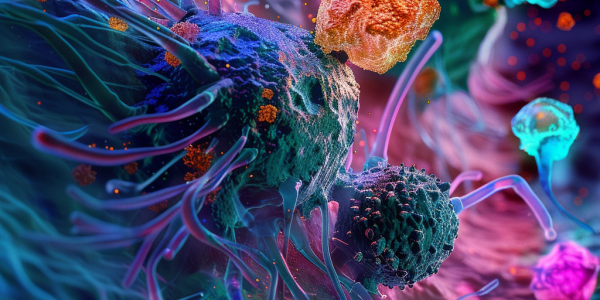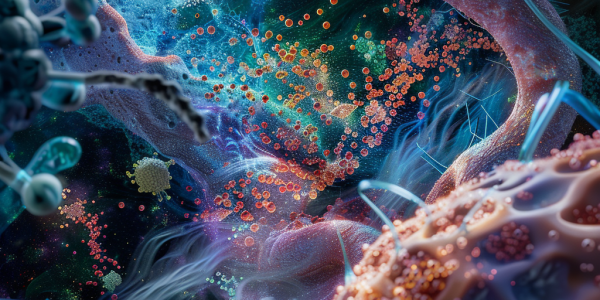Study Reveals Role of P-Stalk Ribosomes in Cancer Immune Evasion
A groundbreaking study published in Cell reveals the critical role of P-stalk ribosomes (PSRs) in cancer’s immune evasion mechanisms, highlighting their impact on tumor detection by CD8+ T cells. This research paves the way for novel cancer immunotherapy strategies by targeting PSRs to enhance immune responses against tumors.
Nanotechnology Breakthrough Offers Targeted Treatment for Acute Myeloid Leukemia
Recent advancements in nanotechnology offer a groundbreaking treatment for acute myeloid leukemia (AML). Researchers at UNIST have developed a novel nanoparticle system that selectively targets and destroys leukemia cells while minimizing side effects. This innovative approach could revolutionize cancer treatment, providing safer alternatives to traditional chemotherapy and improving survival rates for patients with AML.
Breakthrough Biologic Drug Targets Mutant HER2 Protein for Cancer Treatment
A groundbreaking study from NYU Langone Health has developed a new biologic drug targeting mutant HER2 proteins, promising effective cancer treatments with minimal side effects. This targeted therapy represents a significant advancement in oncology, paving the way for personalized medicine and improved patient outcomes.
Great Bay Bio Launches Intelligent Drug Development Ecosystem in Suzhou
Great Bay Bio (GBB) launched its Intelligent Drug Development Ecosystem on October 18, 2024, in Suzhou, China, aiming to revolutionize biopharmaceutical development. This innovative system streamlines drug discovery and bioprocess development, addressing industry challenges like high costs and lengthy timelines. Co-founders Mr. Kingsley Leung and Dr. Michael Chen emphasized the ecosystem’s potential to enhance efficiency and collaboration in drug development, paving the way for faster, cost-effective solutions that benefit patients worldwide.
UNC Researchers Uncover New Role of 2’3′-cGAMP in Cancer Metastasis
The UNC School of Medicine’s groundbreaking study reveals a new role for the molecule 2’3’-cGAMP in cell migration and cancer metastasis, highlighting its interaction with Rab18. This research opens pathways for innovative cancer treatments and enhances understanding of immune responses and tumor progression.
Breakthrough Research Uncovers Protein’s Role in Healthier Aging
Groundbreaking research from McMaster University reveals the protective role of MANF proteins in cellular health, offering new hope for innovative treatments targeting age-related diseases like Alzheimer’s and Parkinson’s. This study highlights the importance of protein management in promoting healthier aging and mitigating cognitive decline.
Navigating Privacy and Breakthroughs in Multiple Sclerosis Research
In today’s digital age, understanding privacy choices is crucial as users navigate online platforms. Essential cookies ensure basic functionality, while optional cookies enhance user experience but may involve data sharing with third parties. Recent research in regenerative medicine highlights a groundbreaking study on CRISPR-edited cells that could improve remyelination in Multiple Sclerosis, offering hope for new treatments. Stay informed about your online privacy and the latest scientific advancements.
Breakthrough Discovery of Molecular Switch Offers New Hope for Cancer Treatment
Researchers at Ludwig-Maximilians-Universität München have discovered a novel molecular switch that protects cells from death, particularly under oxidative stress. This groundbreaking study, led by Professor Alexander Bartelt, focuses on the role of ferroptosis in cancer treatment and cell protection. By targeting the enzyme DDI2, scientists aim to develop new therapies that enhance cell survival and improve cancer treatment outcomes. This research promises significant advancements in understanding cell death mechanisms and therapeutic strategies.
Breakthrough Research Uncovers Mechanism of Microtubule Formation in Cells
Recent research from IRB Barcelona and CNIO reveals how the protein CDK5RAP2 activates the microtubule nucleator γ-tubulin ring complex (γTuRC), crucial for cell structure and division. This groundbreaking study, published in Developmental Cell, enhances our understanding of microtubule dynamics and its implications for cancer treatment, paving the way for more effective therapies targeting cellular dysfunction.
Groundbreaking Research Reveals ‘Third State’ of Cells After Death
Scientists have discovered a ‘third state’ of cells that allows them to exhibit new functionalities even after death, challenging traditional biological concepts. This groundbreaking research, led by biologists Peter Nobel and Alex Pozhitkov, reveals the adaptability of cells known as xenobots and anthrobots, which can reorganize and thrive post-mortem. Their findings, published in the journal Physiology, suggest that cellular systems possess a remarkable plasticity, opening new avenues for regenerative medicine and our understanding of life and death.










